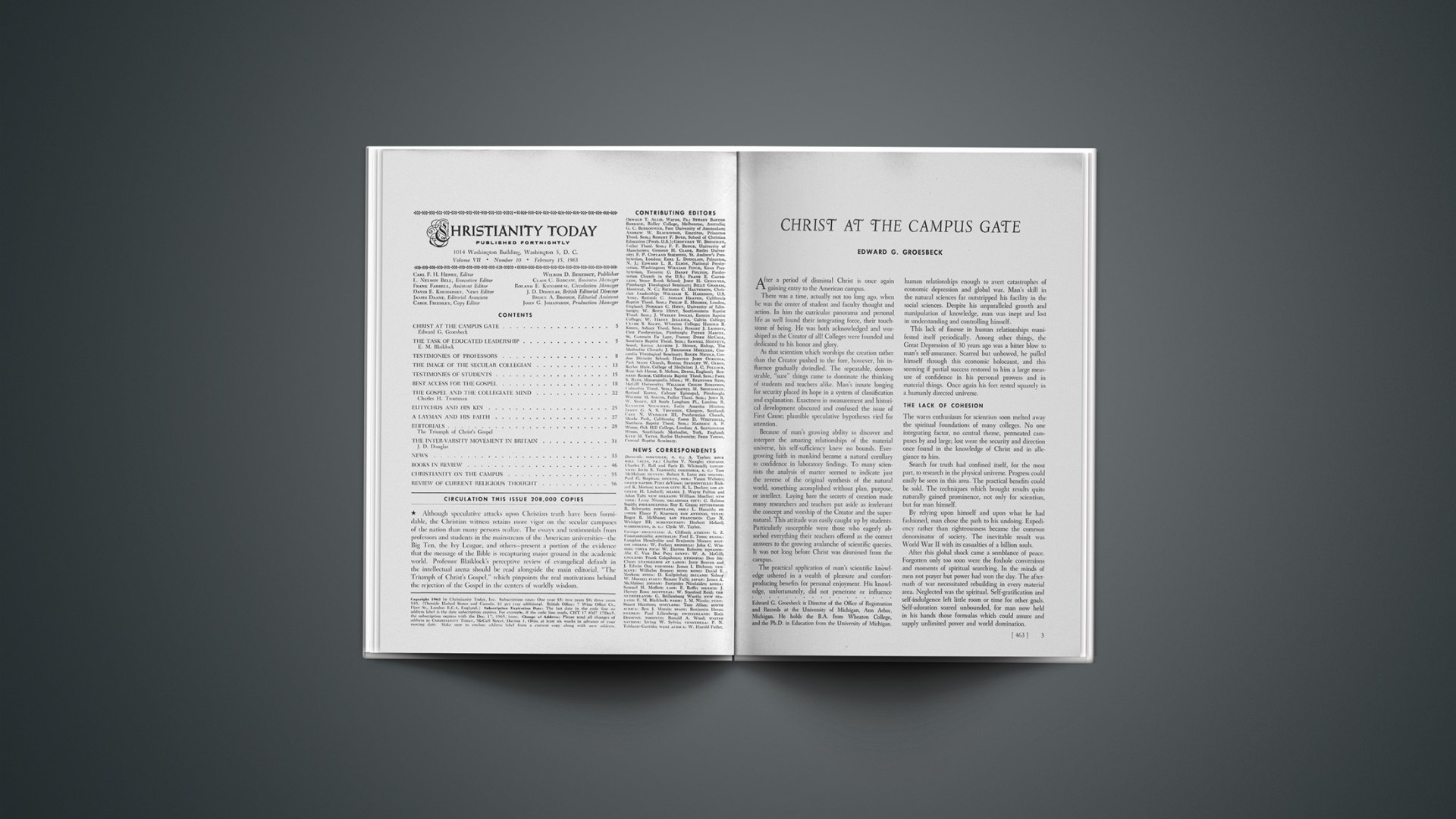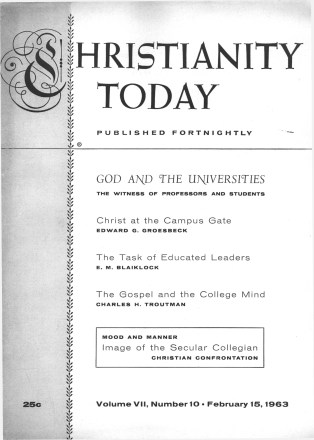After a period of dismissal Christ is once again gaining entry to the American campus.
There was a time, actually not too long ago, when he was the center of student and faculty thought and action. In him the curricular panorama and personal life as well found their integrating force, their touchstone of being. He was both acknowledged and worshiped as the Creator of all! Colleges were founded and dedicated to his honor and glory.
As that scientism which worships the creation rather than the Creator pushed to the fore, however, his influence gradually dwindled. The repeatable, demonstrable, “sure” things came to dominate the thinking of students and teachers alike. Man’s innate longing for security placed its hope in a system of classification and explanation. Exactness in measurement and historical development obscured and confused the issue of First Cause; plausible speculative hypotheses vied for attention.
Because of man’s growing ability to discover and interpret the amazing relationships of the material universe, his self-sufficiency knew no bounds. Ever-growing faith in mankind became a natural corollary to confidence in laboratory findings. To many scientists the analysis of matter seemed to indicate just the reverse of the original synthesis of the natural world, something acomplished without plan, purpose, or intellect. Laying bare the secrets of creation made many researchers and teachers put aside as irrelevant the concept and worship of the Creator and the supernatural. This attitude was easily caught up by students. Particularly susceptible were those who eagerly absorbed everything their teachers offered as the correct answers to the growing avalanche of scientific queries. It was not long before Christ was dismissed from the campus.
The practical application of man’s scientific knowledge ushered in a wealth of pleasure and comfort-producing benefits for personal enjoyment. His knowledge, unfortunately, did not penetrate or influence human relationships enough to avert catastrophes of economic depression and global war. Man’s skill in the natural sciences far outstripped his facility in the social sciences. Despite his unparalleled growth and manipulation of knowledge, man was inept and lost in understanding and controlling himself.
This lack of finesse in human relationships manifested itself periodically. Among other things, the Great Depression of 30 years ago was a bitter blow to man’s self-assurance. Scarred but unbowed, he pulled himself through this economic holocaust, and this seeming if partial success restored to him a large measure of confidence in his personal prowess and in material things. Once again his feet rested squarely in a humanly directed universe.
The Lack Of Cohesion
The warm enthusiasm for scientism soon melted away the spiritual foundations of many colleges. No one integrating factor, no central theme, permeated campuses by and large; lost were the security and direction once found in the knowledge of Christ and in allegiance to him.
Search for truth had confined itself, for the most part, to research in the physical universe. Progress could easily be seen in this area. The practical benefits could be sold. The techniques which brought results quite naturally gained prominence, not only for scientism, but for man himself.
By relying upon himself and upon what he had fashioned, man chose the path to his undoing. Expediency rather than righteousness became the common denominator of society. The inevitable result was World War II with its casualties of a billion souls.
After this global shock came a semblance of peace. Forgotten only too soon were the foxhole conversions and moments of spiritual searching. In the minds of men not prayer but power had won the day. The aftermath of war necessitated rebuilding in every material area. Neglected was the spiritual. Self-gratification and self-indulgence left little room or time for other goals. Self-adoration soared unbounded, for man now held in his hands those formulas which could assure and supply unlimited power and world domination.
To his great horror man discovered his newest creation to be a potential source of utter sell-destruction. This unmistakable evidence of man’s inability to control himself struck a body blow to the self-assurance of intellectual leaders. Soon their uncertainty filtered through to students. Teachers now became colleagues in exploration and lost their status as fountainheads of all wisdom. Faculties came to realize their limitations as never before; they no longer presumed themselves able to chart the end from the beginning. They saw information to be incomplete, the gamut of philosophies inadequate. The college or university professor was now viewed as an inspiring guide to learning, not as a fact- or theory-dispensing machine.
This wholesome cooperative effort by teachers and students, encouraged by mutual realization of man’s incompetence to solve life’s problems by himself, augurs well for genuine spiritual and social, let alone academic, advance.
Students are sensitive to basic realities. The recurring cycles of war, depression, and a defense-based prosperity do not delude them into egotistic self-sufficiency. They recognize and admit the presence of injustice; they want to do something to right social wrongs. They think with their hearts no less than their heads. Distressed by failures of their elders and fearful of similar failures on their own part, young people today feel impelled to find help elsewhere. To recognize the existing problems of human relationships is a credit to anyone. To recognize one’s personal lack for these needs and to seek an adequate source of solution is indeed the beginning of wisdom. This many students are doing today.
The reasonableness of Christ’s claims for solving human problems is beginning to challenge young thinkers. In the minds of many the abysmal depth of human need can be met only by the complete application of Christ’s unique work for man and in history. Gone is the once rampant pride born of self-sufficiency. Instead, healthy humility and honest appraisal of man’s abilities and limitations characterize much of the academic world.
Christ is once again appearing at citadels of learning; moderns are inviting him back.
END










